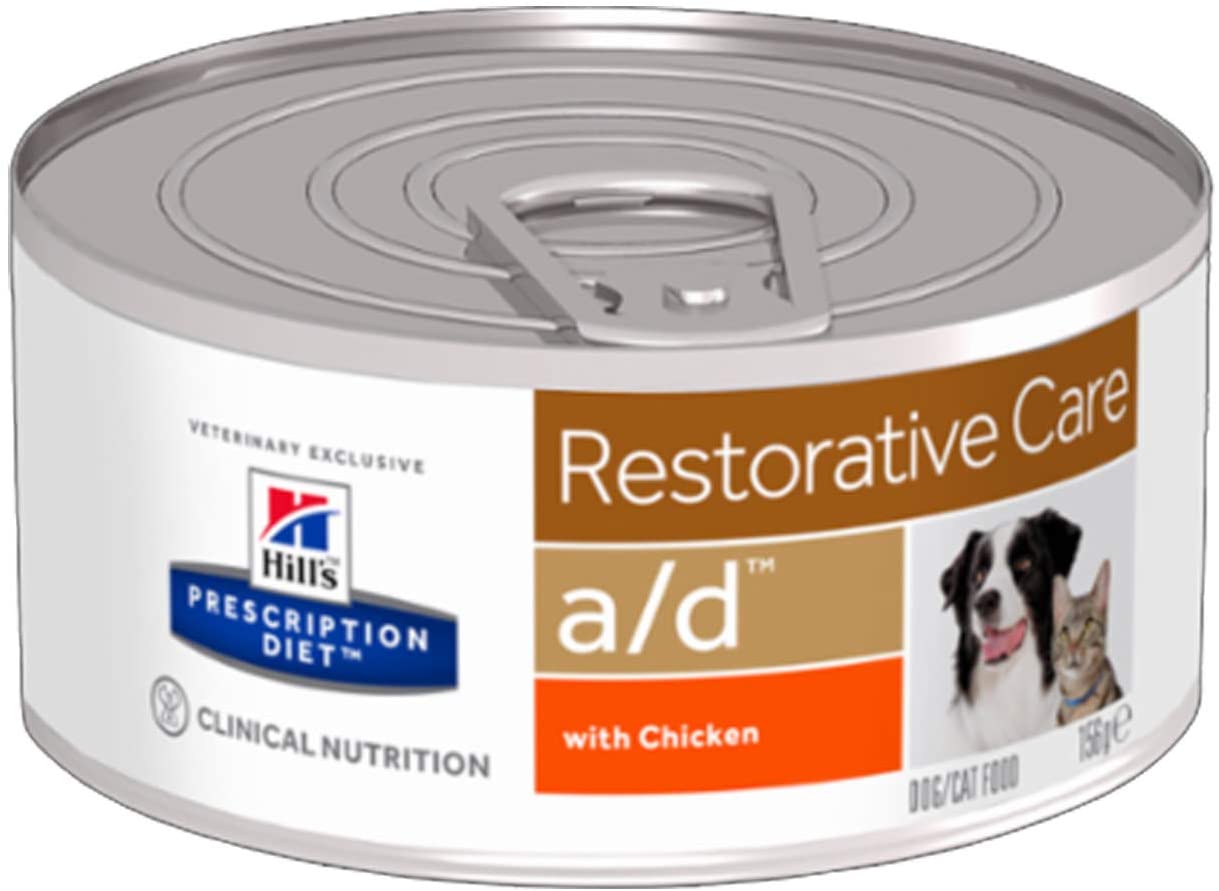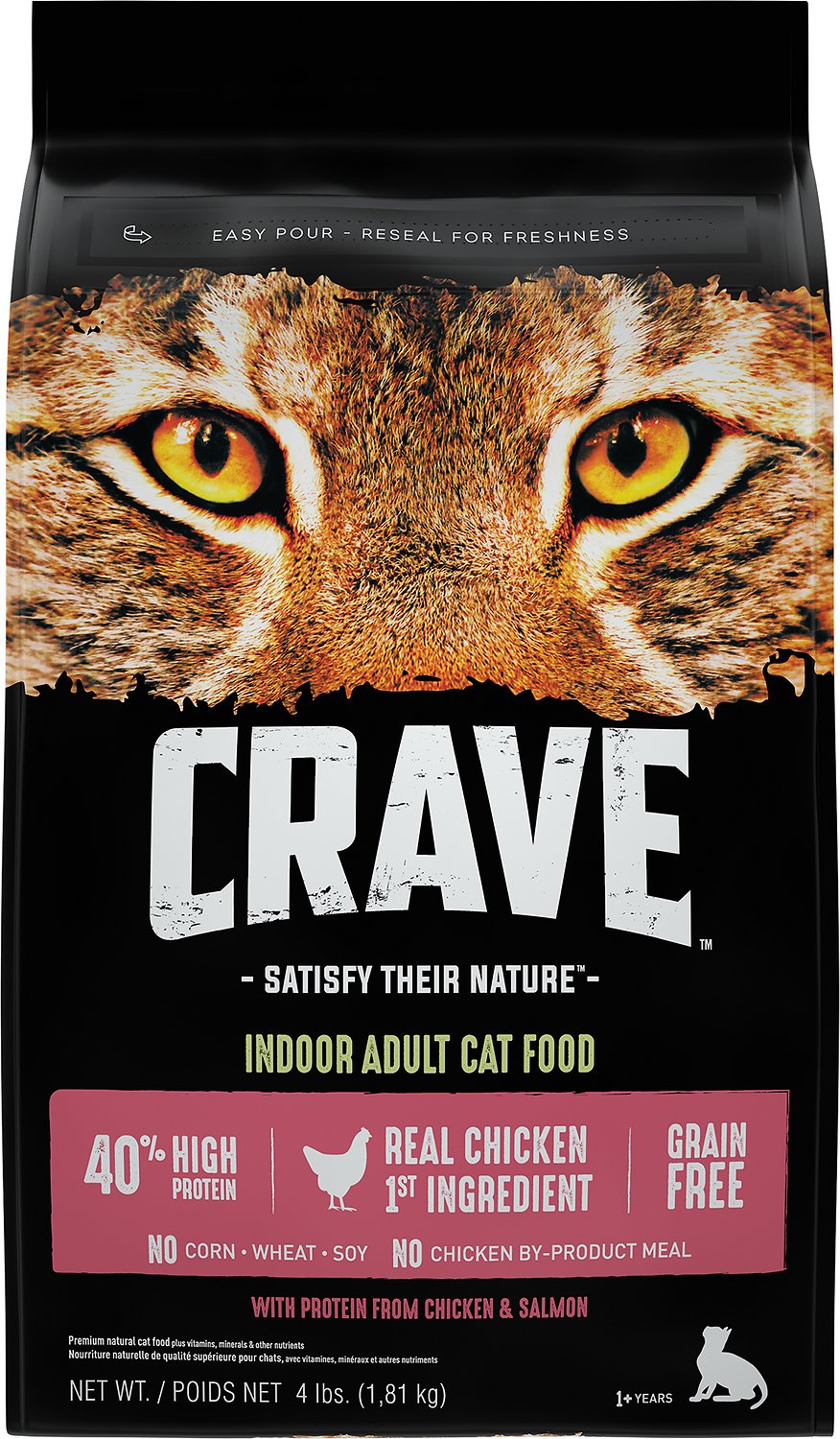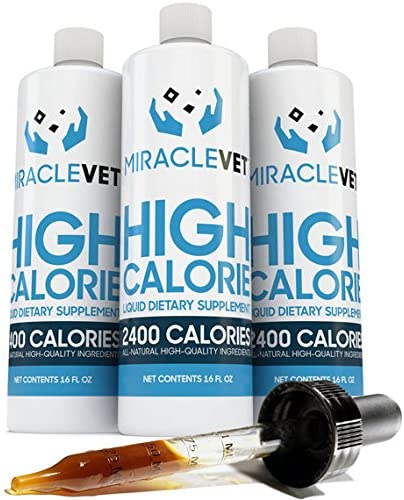Best High Calorie Cat Food
Cat parents would do everything to ensure their kitties are healthy and happy, but so many issues can cause cats to lose weight, but it usually happens when they're not getting a nutritious diet. Just like humans, cats become obese or underweight when they're not eating a healthy, species-appropriate diet. While making sure the cat food contains all important vitamins and minerals, it's equally important to pay attention to how much calories it contains per serving. To help fatty up your cat, you'll have to switch to a high calorie cat food, and that's when you can consider picking one of these options:
High Calorie Cat Food: Our Top Picks
1. Hill's Prescription Diet a/d K9/Fel Critical Care
You may want to try this option if you're looking for the best cat weight gain food for your older skinny cat. This cat food to gain weight works great for your furry friends with little to no appetite. Therefore, this canned cat food is great for your injured and skin cats. It comes with digestible protein, which is why it may also serve well as your go-t0 kitten food.
This canned cat food contains highly digestible protein, which comes from chicken. Therefore, your cat is going to love it and you'll soon notice an improvement in his body mass. At the same time, it strengthens his immune system and supports healing as well.
Another good thing is that you choose this canned cat food if you're looking for something that you could spoon feed your senior cat. Along with high quality protein, it also offers high levels of potassium and added calories to support weight gain in cats. As it's a high calorie, protein-rich food, you may not want to keep your cat on it for a very long time.
PROS
CONS
2. Crave Grain Free High Protein Dry Cat Food
Wet food is usually the better choice for older cats, but if your cat specifically loves dry food, make sure to try this cat food from Crave. It supports weight gain because it's very high in protein. Your cat just doesn't need calories to put on muscle mass, but a cat needs lots of protein along with other nutrients to gain weight in a healthy way, and Crave can help you do that.
The protein your cat needs comes from real chicken, which makes Crave a reasonably good choice for younger cats too. There aren't any meat products in this weight gain cat food, which is another good thing about it.
The absence of grains means you don't need to worry about your cat developing any reaction or allergy. Even though it doesn't contain grains, it still provides cats with a good dose of carbs. So, overall, Crave weight gain cat food is wort a shot, but some people might argue that it doesn't contain a specific weight gain formula.
PROS
CONS
3. Miracle Vet High Calorie Weight Gainer for Cats
If you want your beloved cat to gain weight miraculously, you should put your money on this particular product. Though it's not specifically a cat food, it's a supplement designed to make your ordinary cat food pack a solid calorie punch.
For the ease of use, you can easily mix it in your cat's current food, and it will turn it into a weight gain recipe. As it comes in a liquid form, you can also squirt it into your cat's mouth. You'll notice results within a few weeks because every ounce of this supplement contains 150 calories, with 130 of them coming from healthy fats.
The supplement is supposed to work great for weight gain because it also contains fish oil, which not only makes it more delicious for your cat but also makes it more nutritious by adding omega3 fatty acids to the blend. It doesn't contain any artificial flavors, which is another good thing about it.
Overall, it's a great choice for feline weight gain but some cats might not like its taste when administered directly into the mouth. You can simply mix it in his food then. Also, keep in mind that using it may be an expensive proposition but it does serve the purpose well.
PROS
CONS
FAQ - A Buyer's Guide
It's natural to feel concerned when your cat's consistently losing weight for no apparent reason. Simply making dietary changes won't always lead to weight gain, so it's important you connect with your vet and learn about different factors preventing your cat from maintaining a healthy body weight.
How to Fatten Up a Cat?
In order to help your cat put on some weight, you should try ways that would help her gain a lean muscle mass instead of just putting on layers of fat. Some people would go for dry food to fatten their kitties up, but it usually does nothing other than adding too much fat to their body, which can cause other complications. A better way would be to pick a high calorie cat food that also contains loads of protein, fewer carbs, and moderate fat.
Going for a high calorie dry cat food without putting a thought into helping your cat gain lean muscle instead of fat can have consequences. Unlike humans, cats can gain fat but can't convert it into muscle by going to the gym. Therefore, you need to ensure that your cat is getting enough protein and calories to maintain the right balance and prevent protein malnutrition.
Giving dry cat food to your cat is a good way of fattening them up, and dry food is usually better in terms of calories as compared to wet food. Therefore, a simple way to fatten up your cat is to increase the dry food portion. You'll benefit more if you pick a dry cat food with high proteins and higher fat as well. The protein added to the cat food should be of very high quality and fats should always come from animal sources and not just plant stuff. In fact, it's better to avoid high calorie cat food that mostly contains soy, wheat, corn, and by-products because they aren't going to serve the purpose of helping your cat gain weight in a healthy way.
Under normal circumstances, adult cats would need about 20-35 calories for every pound of body weight to maintain their healthy weight. Indoor cats don't need as much though and usually do well with no more than 20 calories per pound every day. It means that an indoor cat with a body weight of 12 pounds should get at least 250 calories a day to maintain their normal body weight.
If your cat is underweight, it's a different story altogether. For severely underweight cats, it's important to talk to the veterinarian first to resolve the issue. If your cat is only slightly underweight, you can simply increase portion sizes or switch to a better cat food for underweight cats with high calorie and protein contents. Consider feeding your cat several smaller meals throughout the day. In households with multiple cats, it's possible that your underweight cat isn't getting his portion. Try feeding him separately to see if it helps him put on more weight.
Keep in mind that cat foods with high calories do work but finding the best one is the real catch. You need to look for cat foods with a guaranteed analysis showing at least 5% crude fat with 10% crude protein, 78% moisture, 1% crude fiber, and some taurine added to the blend. In other words, the best high calorie cat food comes with at least 45.45% protein and around 22.72% fat – it should offer at least 97 calories in a 3.5oz can. This kind of food usually works fine for most adult cats, but if you believe your cat badly needs to put on some weight, you may want to go for a food with even higher caloric count.
Considering the dry matter figures for cat foods will help you compare different products to find something that's perfect for your beloved cat. If you're buying canned foods though, keep in mind that comparing them can be tricky because of their size variations. Therefore, comparing a 3.5oz can with a 5.5oz can isn't going to be easy, so be prepared to do some math.
Here, it's important to understand that you can fatten up your cat if you make him eat more. Your goal should be to get him what he likes eating. If he's happy with canned food, get more of it. If he likes to eat more kibble, you should go for dry food because eating more is ultimately going to ensure that your cat keeps putting on weight. Just make sure to give your cat more water to drink if he's on dry cat food, as it helps prevent urinary tract problems.
Similarly, another good trick to help your cat gain fat is to give him some kitten food. These foods will come with a higher caloric count and protein because younger cats need more of these nutrients. Similarly, you can try giving him some leftovers of safe foods from your own kitchen, as the more they eat, the higher the chances of them gaining weight. But whatever you do, understand that it's never a good idea to make your cat to gain or lose weight too quickly. If he puts on some weight slowly, it's healthier for him and he's likely to maintain it over a long period. So, set realistic goals and understand that even if he gains a couple of ounces per week, it still shows improvement and you should be happy with it.
What to Feed and Old Cat to Gain Weight?
Before you try anything to help an old cat gain weight, it's better to go for a senior check-up at the vet. It's natural for most dogs and cats to lose some weight as they get older. This usually happens because of metabolism changes, which keep your cat from breaking down food as usual to get some energy. It could also lead to some vitamin and mineral deficiencies, which is why it's important to discuss your concerns with your vet first.
In most cases, your vet will suggest cat food that contains more protein, has plenty of calories, and is easy to digest at the same time. Finding the best cat food for weight gain can sometimes becomes a bit tricky because cats are generally on the other side of the weight spectrum and become obese quite easily. Therefore, you'll find cat food manufacturers to focus more on producing food to help reduce weight or maintain a healthy weight.
In this situation, your goal should be to opt for a food that offers the highest amount of protein to your cat – be sure to consult with your vet because older cats with kidney disease should not go for high protein food. Remember, there's no point in loading up on carbs to fatten up your older cats because they just can't digest them well.
Besides trying high quality cat food, you may want to include high-calorie supplements in your cat's diet to increase his calorie count. The good thing is that many of these supplements are designed to provide your cat with a high dose of vitamins, minerals, and protein. It's worth mentioning though that older cats can be picky eaters, so not everything you use will work. Therefore, making food more palatable is also important.
Things can get difficult with older cats because sometimes they'd refuse to eat their favorite food and saunter away after eating a little. To resolve the issue, you should ensure that your cat is not in stress for any reason. If that's not the case, try feeding him multiple times throughout the day. Even if he eats a little at each meal, he'll get enough calories throughout the day.
And finally, try foods that don't smell bland and unappetizing. Try those fish flavors he loves, as it may help pique his interest. Similarly, trying some appetite stimulants may help a little. You can try a drug called mirtazapine, which is available in pill form as well as in a transdermal formula to rub on your cat's skin. Valium is another drug used to help boost your cat's appetite.
It implies that finding the right cat food is important if you're trying to help your older cats gain weight. But, always bear in mind it's better to let your vet take charge of things if you notice your beloved cat becoming disconcertingly bony.
Is My Cat Underweight?
When you love your cat, it's natural to worry when you notice him losing a little weight. Sometimes, he's still has a healthy weight and there's nothing really to worry about finding any special high calorie cat food. Therefore, it's a good idea to educate yourself a bit about confirming if your cat is really underweight.
Mostly, domestic mixed-breed cats weigh anywhere around 8-10 pounds, but specific breeds may weigh a bit more or, sometimes, less depending on their size. For instance, a Siamese cat is considered healthy if he weighs around 5-10 pounds, whereas the Persian's idea weight is around 7-12 pounds.
An important thing to understand is that even if your cat weighs 10-20% less than their ideal body weight, you should take it seriously. A cat doesn't weigh much, so even a 10% reduction matters a lot. Imagine a person weighs 120 pounds and loses 10-20% of body weight, it means that the new weight is 96 pounds, which is hugely underweight.
Why Is My Cat So Skinny?
In order to do something to help your cat gain weight, it's also important to work with your vet to identify the underlying causes of weight loss. So many factors go into determining how quickly your cat ends up losing weight. For instance:
Senior cats would lose weight because of their slow metabolism. They won't be able to process food as efficiently as before, which can cause vitamin and mineral deficiency. Quite interestingly, your cat might still be eating as much food as before, which indicates a slower metabolism.
So many cats lose weight because of hyperthyroidism or overactive thyroid. The condition is more common in senior cats. With hyperthyroidism, your cat won't lose his appetite but you will notice that she just can't put on weight. Vomiting is another sign besides weight loss that your cat is dealing with thyroid issues.
Some cats would experience weight loss because of diabetes. Quite recently, more and more cats are developing this condition, which triggers appetite but keeps your cats from maintaining a healthy weight. Frequent urination and increased thirst are other common symptoms of feline diabetes.
Expect your cat to lose weight quite quickly if he's dealing with kidney disease. Increased thirst and frequent urination are also signs of kidney disease in cats. Chronic renal failure will also lead to rapid weight loss in cats.
Some cats may lose weight when they are under stress. Cats may feel stressed when you bring a new pet home. Any change in their routines may also cause unnecessary stress, which directly affects their appetite and leads to weight loss.
Some cats would become underweight when they develop gastrointestinal problems, such as inflammatory bowel disease, constipation, gastroenteritis, and pancreatitis.
It's natural for cats to lose weight when they have food sensitivities or food allergies. Food allergies can cause gastrointestinal problems, including diarrhea, etc., which can cause cats to lose weight.
Sometimes, cats lose weight because they can't eat enough for any reason, such as toothache. The problem is that most cat owners take toothache as something else, like a lack of interest in food. It's especially true in case of older cats. Be sure to talk to your vet and they may help identify any dental problems keeping your cats from eating enough.
Other than these issues, cats can lose weight when they have worms or other intestinal parasites. Sometimes, serious conditions are causing your cat to become skinny by the day – cancer for instance can play a role and so can serious cardiovascular disease. Therefore, you need to understand that though dietary changes are important to help your cat regain his healthy weight, you should talk to your vet to ensure there's nothing serious causing all these weight changes.
Try the Best High Calorie Cat Food
It boils down to the fact that so many factors can cause weight loss in cats, but you need to be very careful when making dietary changes. Going for the best high calorie cat food is often the way to go, but be sure to watch your cat carefully and ensure that your strategies are working. Ensure that your cat doesn't develop any new symptoms and consult with your vet immediately if something changes. If you're looking for high calorie cat food to fatten up your cat, you may want to try Crave grain free cat food, which may help because of its high protein content.
About the Author Steven
Related Posts
Is It More Cost Effective To Build Your Own Aquarium?
DOT Announces Upcoming Changes for ESAs and Plane Travel
Best Cleaning Tips for Your Aquarium
Best Waterless Shampoos for Your Dog
Best Muzzles for Your Pit Bulls
Best Indestructable Dog Kennels in the Market Right Now




